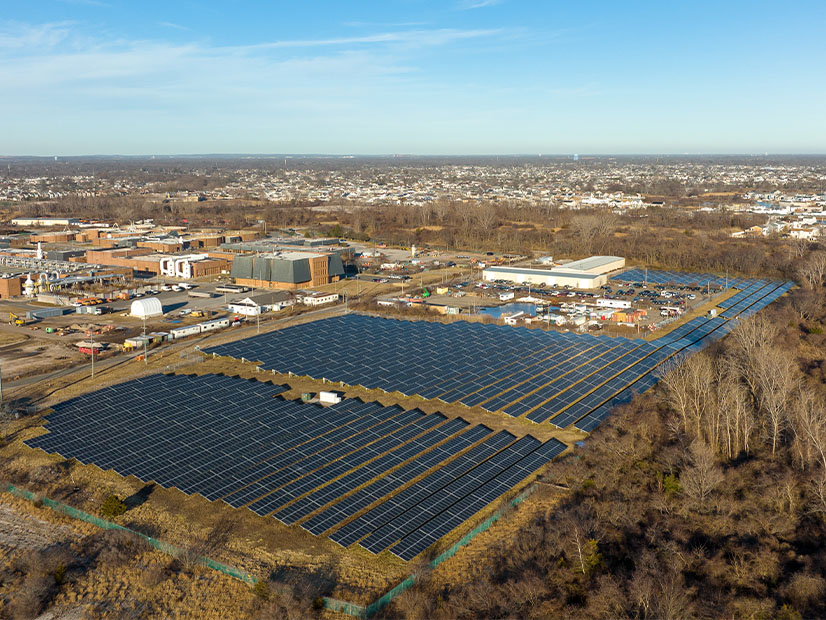Clean energy companies and trade groups proposed a series of amendments to ISO-NE’s proposed Order 2023 compliance at the NEPOOL Transmission Committee meeting Jan. 4, as the RTO and its stakeholders scramble to reach a consensus prior to the scheduled TC vote in February.
The compliance filing is set to bring sweeping interconnection changes as ISO-NE switches from a first-come, first-served queue to a process in which interconnection requests are studied simultaneously in large clusters.
ISO-NE discussed the initial details of its compliance over several TC meetings throughout the fall and presented the detailed tariff changes of its compliance proposal to the TC in December. (See ISO-NE Details Order 2023 Tariff Changes.)
The RTO has proposed several deviations from the specific approach detailed in FERC’s order, including a 270-day cluster study timeline, compared to FERC’s 150-day timeline. Advanced Energy United, a clean energy trade group, called for ISO-NE to stick to FERC’s timeline.
Alex Lawton of United said a significant extension of the study timeline could undermine the order’s goal of reducing interconnection delays and could cause future uncertainty if FERC ultimately rejects this request.
“Recognizing there are challenges and constraints in conducting cluster studies, we are concerned the filing will be rejected and interconnection study timelines will not be significantly improved without a 150 days requirement,” Lawton said. “Submitting the 270 days proposal therefore introduces significant regulatory risk.”
For the initial transitional cluster study process, the clean energy association RENEW Northeast proposed to add a customer engagement window within the existing time frame. While later clusters will have a customer engagement window at the beginning of the process for questions and feedback between interconnection customers and the RTO, ISO-NE’s current proposal does not include this opportunity in the initial cluster study.
“Without sufficient information about potential members of the transitional cluster or the ability to ask the ISO or interconnection transmission owners questions about a proposed interconnection, customers are asked to decide whether to enter the transitional cluster with incomplete information,” said Abby Krich on behalf of RENEW.
United, with the support of New Leaf Energy, also proposed to reduce the transitional cluster’s large generator commercial readiness deposits (CRDs) from $5 million to $2.25 million. CRDs are intended to prevent speculative projects from entering the cluster.
ISO-NE has smaller average project sizes compared to RTOs like PJM and MISO, Lawton said, adding that the $5 million deposit “disproportionately impacts commercially ready smaller projects that may be comparably mature.”
Lawton called the $5 million CRD “far less appropriate for ISO-NE, which has smaller projects and relatively less of a queue backlog.”
Meanwhile, Glenvale Solar advocated for reduced CRDs that are scaled to project size for the cluster studies that follow the initial transitional cluster.
“It is especially critical to manage costs for smaller generators (including smaller LGIRs) to ensure project development costs are as rational as possible” said Aidan Foley of Glenvale. “This will ensure the maximum number of generators reach the market.”
Foley said keeping deposits as low as possible “will maintain relative competitiveness with other RTOs where ICs parent companies are active. This will ensure that project sponsors find New England a compelling geography to direct investments to.”
Glenvale also proposed a reduction in deposits for projects that do not increase the generation capacity at a given site, such as repowering or adding batteries to a site.
Regarding withdrawal penalties in the transitional cluster, Glenvale is supporting New Leaf’s proposal to calculate the penalties based on costs incurred only during the transitional cluster, instead of based on a project’s total study costs since the project entered the queue.
Alex Chaplin of New Leaf said ISO-NE’s current proposal would unfairly increase withdrawal penalties for projects that already have included study costs associated with incomplete interconnection studies prior to the transitional cluster.
“This leads to similarly situated projects being subject to significantly different withdrawal penalties,” Chaplin said.
Meanwhile, RENEW proposed to exempt interconnection customers from withdrawal penalties if their decision to enter the cluster study was based on incorrect or misleading information provided at the beginning of the process.
“When this happens today, the interconnection customer must deal with the variety of consequences, but is not charged a withdrawal penalty,” RENEW wrote in a December memo. “With the introduction of a withdrawal penalty, it is appropriate to create an exception for this to protect everyone in the process.”
RENEW also proposed several amendments related to the distinctions between resources that request energy-only interconnection and resources that request both capacity and energy interconnection service. The trade group said interconnection customers should have the option to “downgrade” their request to energy-only interconnection based on study results.
Without this option, “the ISO proposal would prevent otherwise-viable energy-only projects from moving forward to commercial operation on a timely basis, result in additional withdrawals, reallocation of costs and further withdrawals,” Krich told the TC.
RENEW also proposed that ISO-NE differentiate between energy and capacity costs incurred in cluster studies. Grouping these costs together would burden energy-only interconnection customers with “a portion of the cost of identifying incremental upgrades required for the [capacity network resource interconnection service] requests, from which they do not benefit in any way,” RENEW wrote in the memo.
The TC will meet again Jan. 23 as it prepares for a vote on the compliance proposal in February.




